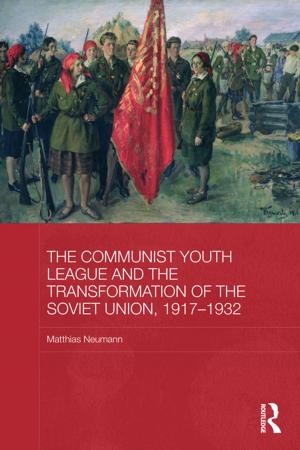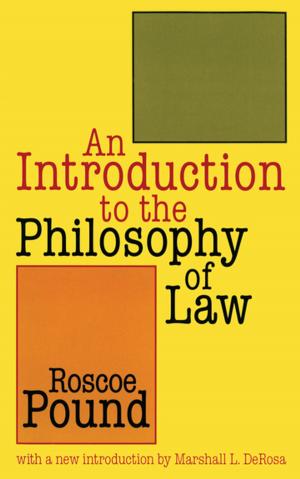Social Contract Theory in American Jurisprudence
Too Much Liberty and Too Much Authority
Nonfiction, Social & Cultural Studies, Political Science, Politics, History & Theory, Government| Author: | Thomas R. Pope | ISBN: | 9781135935320 |
| Publisher: | Taylor and Francis | Publication: | June 7, 2013 |
| Imprint: | Routledge | Language: | English |
| Author: | Thomas R. Pope |
| ISBN: | 9781135935320 |
| Publisher: | Taylor and Francis |
| Publication: | June 7, 2013 |
| Imprint: | Routledge |
| Language: | English |
Despite decades of attempts and the best intentions of its members, the United States Supreme Court has failed to develop a coherent jurisprudence regarding the state’s proper relationship to the individual. Without some objective standard upon which to ground jurisprudence, decisions have moved along a spectrum between freedom and authority and back again, affecting issues as diverse as individual contractual liberties and the right to privacy.
Social Contract Theory in American Jurisprudence seeks to reintroduce the lessons of modern political philosophy to offer a solution for this variable application of legal principle and to lay the groundwork for a jurisprudence consistent in both theory and practice. Thomas R. Pope’s argument examines two exemplary court cases, Lochner v. New York and West Coast Hotel v. Parrish, and demonstrates how the results of these cases failed to achieve the necessary balance of liberty and the public good because they considered the matter in terms of a dichotomy. Pope explores our constitution’s roots in social contract theory, looking particularly to the ideas of Thomas Hobbes for a jurisprudence that is consistent with the language and tradition of the Constitution, and that is also more effectually viable than existing alternatives. Pope concludes with an examination of recent cases before the Court, grounding his observations firmly within the developments of ongoing negotiation of jurisprudence.
Addressing the current debate between individual liberty and government responsibility within the context of contemporary jurisprudence, Pope considers the implications of a Hobbesian founding for modern policy. This book will be particularly relevant to scholars of Constitutional Law, the American Founding, and Modern Political Theory.
Despite decades of attempts and the best intentions of its members, the United States Supreme Court has failed to develop a coherent jurisprudence regarding the state’s proper relationship to the individual. Without some objective standard upon which to ground jurisprudence, decisions have moved along a spectrum between freedom and authority and back again, affecting issues as diverse as individual contractual liberties and the right to privacy.
Social Contract Theory in American Jurisprudence seeks to reintroduce the lessons of modern political philosophy to offer a solution for this variable application of legal principle and to lay the groundwork for a jurisprudence consistent in both theory and practice. Thomas R. Pope’s argument examines two exemplary court cases, Lochner v. New York and West Coast Hotel v. Parrish, and demonstrates how the results of these cases failed to achieve the necessary balance of liberty and the public good because they considered the matter in terms of a dichotomy. Pope explores our constitution’s roots in social contract theory, looking particularly to the ideas of Thomas Hobbes for a jurisprudence that is consistent with the language and tradition of the Constitution, and that is also more effectually viable than existing alternatives. Pope concludes with an examination of recent cases before the Court, grounding his observations firmly within the developments of ongoing negotiation of jurisprudence.
Addressing the current debate between individual liberty and government responsibility within the context of contemporary jurisprudence, Pope considers the implications of a Hobbesian founding for modern policy. This book will be particularly relevant to scholars of Constitutional Law, the American Founding, and Modern Political Theory.















